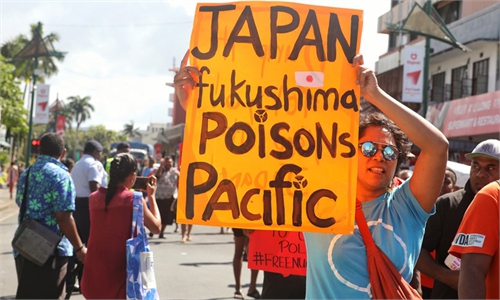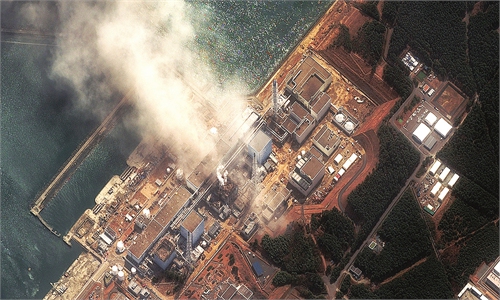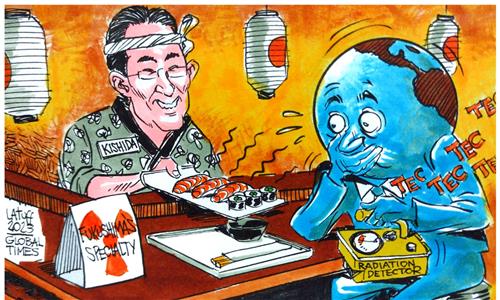IN-DEPTH / IN-DEPTH
GT investigates: As the sword of Damocles hanging over global security crashes down, what can the international community do?
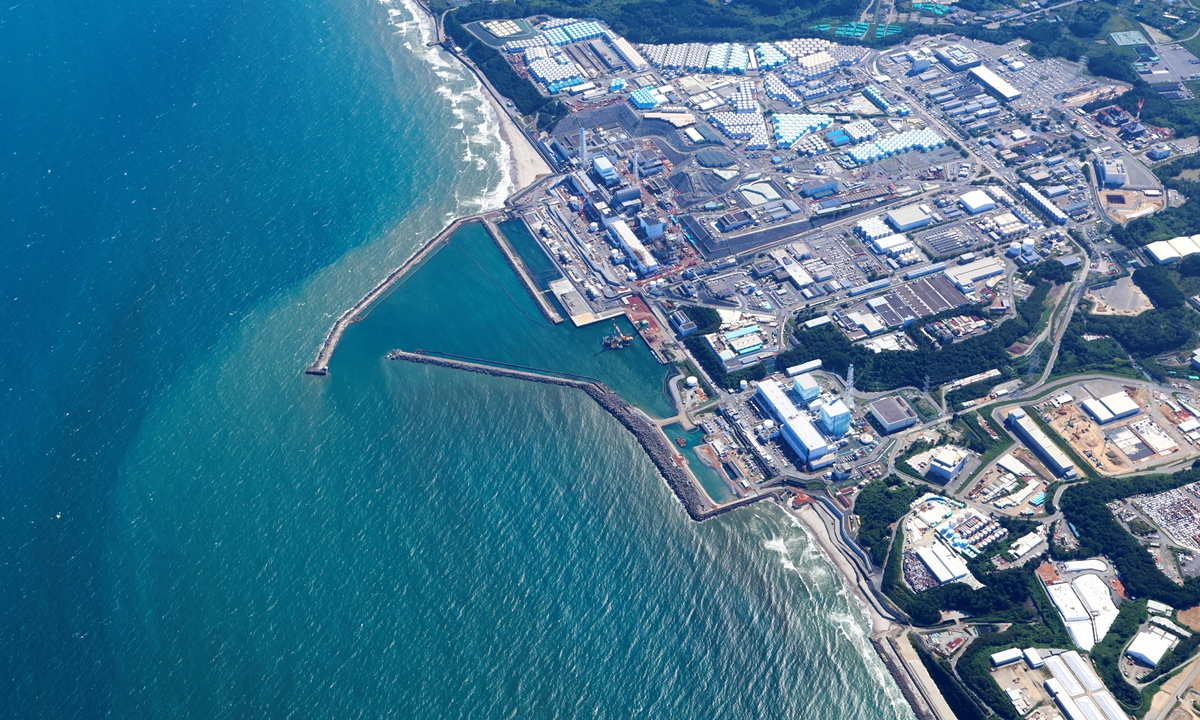
Nuclear-contaminated wastewater is being dumped from the TEPCO Fukushima Daiichi nuclear power plant into the ocean. An aerial view showing that the discharge is causing discoloration in Okuma, Fukushima, Japan on August 24, 2023. Photo: VCG
Editor's Note:
Despite worldwide oppositions and criticism, the Japanese government went ahead with its nuclear-contaminated wastewater dumping plan on August 24, opening a Pandora's Box of unfathomable consequences. Rather than responding to global concerns, the Japanese government attempts to obfuscate public spotlight by transforming itself into a victim.
In the first installment of the investigative story, the Global Times reveals the fallacy propagated by Japan and some Western media outlets to slander China in an attempt to shift international focus away from the culprit and suggests other efforts that can be made by the international community. In the second installment, the Global Times will look into Japan's strategies to whitewash its unilateral move and ill intentions behind the wastewater dumping implementation.
Hours after Japan started to dump nuclear-contaminated wastewater into the ocean on August 24, Chinese seafood distributor Xiao Maoxu posted an advertisement on social media promoting her crabs. "Buy the crabs as early as possible," she wrote. "No one knows whether we will be able to eat them in the future."
A resident of the Zhoushan Islands, the largest Chinese archipelago in the East China Sea, Xiao has been selling local freshly caught marine products for years. The Kishida administration's reckless dumping of Fukushima nuclear-contaminated wastewater has worried people engaged in seafood-related industries, including Xiao. They are angry and perplexed about the reckless dumping, but sadly can do little about it.
Now, Japan has brought the sword of Damocles, which was hanging over its own national and global security, crashing down regardless of strong condemnation from the international community. The wastewater dumping, which may last as long as 30 years, is going to have far-reaching effects on global marine ecosystem and organisms therein, and no humans will be spared in the end. The confusion, worry, and concern witnessed in the marine industry in East Asia is just the tip of the tragedy iceberg.
Xiao heard that the discharged nuclear-contaminated wastewater will reach the coastal waters of China some 240 days after release, based on research conducted by Tsinghua University scholars. "By that time, if no one buys my products, I will have to change my profession," Xiao told the Global Times. "I didn't expect Japan to be so shameless and unconscionable."
A heavy blow
Those who live on marine products will be the first to bear the consequences of the wastewater dumping.
Crabs are likely to be retailed at higher prices in the coming autumn, said Xiao.
After the start of this year's fishing season in early August, she usually waits for the returning fishing boats late at night, and the dock is always crowded with similar seafood distributors. They are enjoying a sort of momentary happiness before being permanently hurt by the "evils" to come from the opened Pandora's Box one day. "There is still a market for aquatic products at present, and the prices are not bad," Xiao told the Global Times. "But it's hard to say what's going to happen after 240 days."
Chinese businesses that import Japanese aquatic products are also on the chopping block. On the same day that Japan started dumping the wastewater, China announced the complete suspension of the importation of aquatic products originating from Japan to protect the health of Chinese consumers.
A company in Zhejiang Province told the media that it would "lose more than 100 million yuan ($13.7 million) a year" if its marine products were detected as containing excessive radiation.
The damage that Japan's wastewater dumping has caused to the upstream fisheries is affecting the downstream catering industry. The irresponsible dumping has dealt a crushing blow to the high-end Japanese restaurants that usually claim that seafood ingredients used at their establishments are flown in from Japan.
An omakase restaurant in Shanghai's Hongkou district whose owner and chef is a Japanese national, for instance, said that more than 90 percent of its ingredients came from Japan. The restaurant suspended its lunch services after China banned seafood imports from Japan, only opening for dinner.
"We well prepared [for the ban] and stockpile a lot of Japanese seafood [ingredients]," a staffer at the restaurant told the Global Times. She nonetheless added that they have no idea what to do when an out-of-stock situation occurs.
An increasing number of Japanese restaurants in China, some of which are well-known, and used to advertise their "Japanese ingredients," now openly acknowledge none of their ingredients are sourced from Japan. In what can only be described as a business survival tactic, such businesses have explained that they only use "Japanese cooking methods" rather "Japanese-imported ingredients."
It is no wonder that such restaurants are eager to distance themselves from Japan: A recent poll by Sina News with some 522,000 Chinese netizen respondents showed that 84 percent have "never" gone or "will no longer" go to Japanese restaurants. It shows an antipathy toward Japan's unscrupulous wastewater dumping, as well as fears for nuclear radiation, according to some respondents.
Such growing fears are also reflected in a sharp increase in the demand in the market of radiation detection instruments: many Chinese radiation detector manufacturers said that they are working overtime to cope with the recent surge in orders.
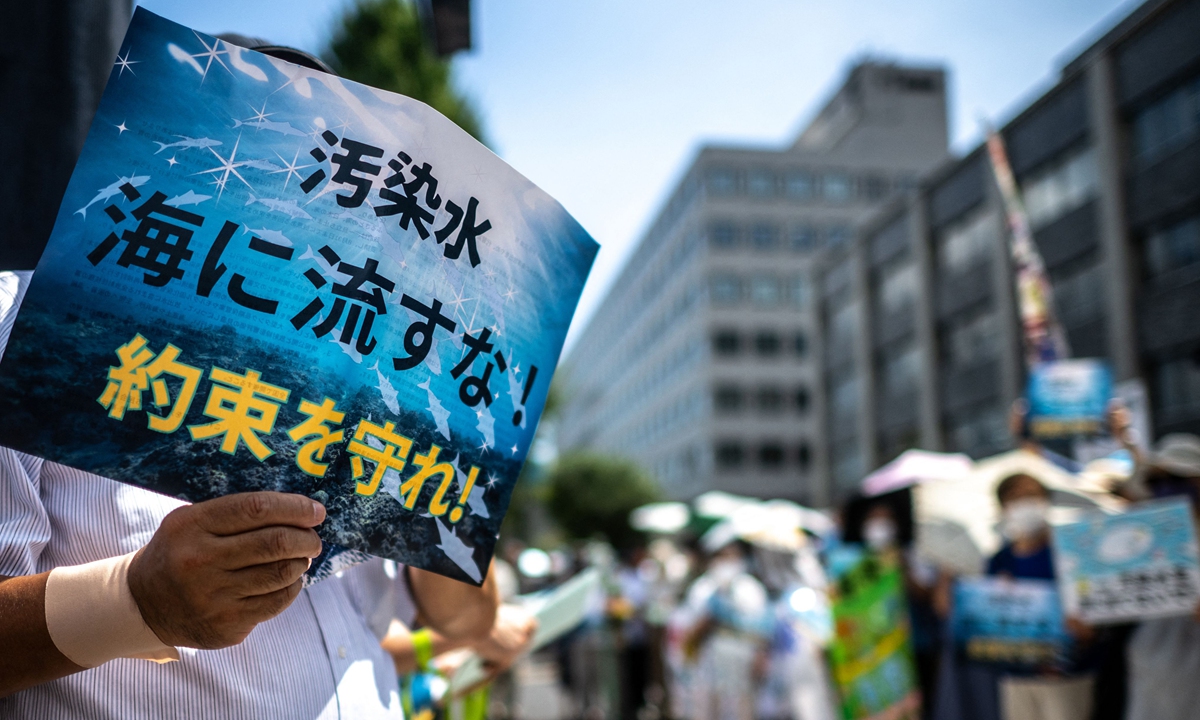
An activist holds a placard that reads "Don't release the polluted water! Keep the promise!" as protesters take part in a rally against the Japanese government's plan outside the Prime Minister's Office in Tokyo, on August 18, 2023. Photo: VCG
Who is flinging mud at China?
Two hours after the wastewater dumping was initiated, China reacted quickly, instituting a total ban on the importation of all Japanese-origin aquatic products, together with enhanced monitoring measures across the country of the marine radiation environment. However, such moves out of concern for people's health and food security have been hyped as an overreaction out of political concerns by some Western media outlets.
For example, a BBC report on August 24 said that China's claim is not "backed by science." Another report on the Chinese language website of the Voice of America (VOA) on August 25 claimed that governments and people in most Southeast Asian countries still have an open and trusting attitude toward Japan's aquatic products, in stark contrast to "the extreme concerns of Chinese netizens and the Chinese government."
China seems to have become a "lonely fighter" according to the Western media narrative. However, do these stories reflect the whole picture?
What these stories fail to mention is that, although US publicly backs the Japanese government's dumping plan, the country largely reduced the importation of Japanese agricultural, forestry-, and fisheries-related products in the first half of the year, and the main production areas affected by such import reductions are within the nuclear-contaminated wastewater dumping zone.
In Thailand, its Food and Drug Administration (FDA) and associated agencies announced a plan to double the volume of seafood samples collected for radioactive material detection, to strengthen consumer confidence in their safety.
Any shipments failing these safety inspections will be sent back, and additional imports will be halted, said Lertchai Lertvut, the Thailand FDA's deputy secretary-general.
In South Korea, survey showed that roughly 80 percent of local residents oppose the Fukushima discharge plan, according to media reports. South Korean President Yoon Suk-yeol's ambivalence toward the dumping has "upset many South Koreans," who are "pressing Yoon to push back harder on Japan," reported Wall Street Journal on August 25.
Yoon's approach to the matter upsets many South Koreans, roughly 80% of whom oppose the Fukushima discharge, according to polls. On Thursday, some 16 college students were arrested for attempting to barge into Japan's Embassy in Seoul. Protests are planned across South Korea in the coming days.
The Japanese government itself has also witnessed surging domestic opposition and protests against the plan. According to a recent survey conducted by researchers from the Hainan University's Belt and Road Research Institute based on key word and text sentiment analysis of data collected between August 1 and August 24 from Google trends, more Japanese Google users (22 percent) were opposed to the plan than those who were supportive (19 percent).
The gap between the government's attitude and public opinion is even sharper in the US, as the survey showed only 2 percent of US netizens supported Japan's actions with another 21 percent in opposition.
Google users in South Korea, the UK, Canada, Singapore, Australia, India, and the Philippines were also found to be paying close attention to the developments of the issue given the frequency of their searches related to the issue on Google, according to Shi Xufeng, deputy dean at the institute and a co-author of the abovementioned survey.
In total, the researchers found that more than 23 percent of global Google users who searched relevant content between August 1 and 24 had expressed opposition to Japan's dumping plan, which is about four times the number of those who expressed support. About 68 percent of the netizens were neutral or did not express a clear stance on the issue.
Given the data, "it is extremely irresponsible for the Japanese government to dump the nuclear-contaminated wastewater into the sea regardless of the international community's fierce opposition," Shi told the Global Times.
Opinion warfare against China, South Korea
The claim that "only China opposes Japan's dumping of nuclear-contaminated wastewater into the ocean" is certainly an absurd statement that ignores objective reality. It is also a deliberate attempt to create a narrative based on confrontational sentiment and heroism, said Chen Yang, a guest professor from the Liaoning University Institute of Japan Studies.
The Tokyo Electric Power Company (TEPCO) itself admitted that about 66 percent of the water in storage tanks exceeded the standard of radioactive substances, reported Japan's TBS TV station on August 26.
With the rise of China's comprehensive strength and Japan's deep involvement in the "lost two decades," some Japanese politicians have gradually distorted their perspective of China and become enthusiastic about instilling the idea of a "Chinese threat" to the public. Against this backdrop, some Japanese politicians deliberately package themselves as "guardians of national interests" who dare to say no to China, in order to maximize their personal interests, according to Chen.
However, these politicians ignore the public interests of the general society and attempt to feign a hollow form of "heroism" to benefit their personal brand and image, ultimately sacrificing the health and wellbeing of the people and the future destiny of the country, Chen noted.
It is also part of the Japanese government's petty niggling from the very beginning to use the nuclear-contaminated wastewater issue to launch opinion warfare especially against China and South Korea where people have raised the strongest objections - while presenting itself as a victim.
The same day the nuclear-contaminated wastewater dumping began, the Japanese Embassy in China issued a warning to Japanese nationals living in the country, reminding them of not "speaking Japanese loudly" when out in public, and "being cautious in your speech and behavior."
Why did the Japanese government issue such a warning, presenting itself as the aggrieved victim? We all know that the villain in this story is the Japanese government and the victims are all the people living in countries that are a part of the Pacific Rim. Hyping the risk of attack against Japanese people in China clearly demonstrates the Japanese government's vicious intention to shift public attention, Lü Chao, an expert on the Korean Peninsula issue at the Liaoning Academy of Social Sciences, pointed out.
The Japanese government certainly knew that the decision to dump nuclear-contaminated wastewater would make a splash in the international community. In order to help promote the process, they obtained a so-called endorsement from the IAEA to help enhance the "reasonableness" and "legitimacy" of the move and win more support from the international community.
Under these circumstances, the Japanese government would deem itself the loser in an opinion warfare if it halts its plan due to opposition from some of its neighbors like China and South Korea, and the issue will therefore be used as a suppression tool against Japan by other countries, according to Chen.
Claiming that other countries are "politicizing" the issue is a diplomatic card Japanese government is playing to obfuscate and distract from the attention of the international opinion, Chen noted, echoing Lü.
Joint effort
Observers have been calling on countries, regions, and industries to claim compensation from the Japanese government.
Law professor Chang Yen-Chiang, who is also the executive director of the Yellow Sea and Bohai Sea Research Institute at the Dalian Maritime University, said China, for instance, can request an advisory opinion from the International Court of Justice (ICJ) through international organizations such as the United Nations (UN) and the International Maritime Organization (IMO).
The advisory opinion would request for the ICJ to prove that Japan's discharge is fully in line with the requirements of international law, Chang told the Global Times.
"If the ICJ's advisory opinion finds there is no international legal basis for the water dumping, we can then bring the case against Japan as a defendant in the ICJ based on the advisory opinion, after the relevant evidence has been fully collected," he noted.
Chinese researchers also called for continuous international efforts - such as a ban on imports of and boycott against Japanese-origin aquatic products - to compel the Japanese government to terminate the dumping plan and deal with the nuclear-contaminated wastewater using more suitable and responsible methods.
Shi proposed the recognition of August 24 as a global disaster day for the marine environment. He suggested that governments and research institutes globally should enhance the monitoring and testing of relevant sea water, aquatic products, agricultural products, and foodstuffs.
"A nuclear accident in one country often has a direct impact on a large number of countries in the region, and the countries in the region hold a broad common interest," Wu Wei, an associated professor in China Institute of Boundary and Ocean Studies of Wuhan University, told the Global Times.
"[We] suggested that relevant countries cooperate to establish a regional mechanism to regulate the operation of nuclear facilities, and review NACW (water from the nuclear accident) emissions," said Wu.

